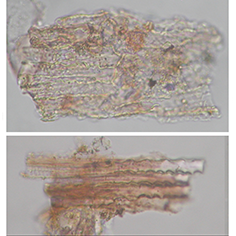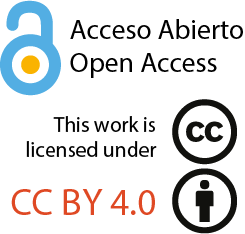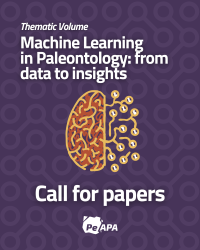SILICEOUS MICROFOSSILS IN THE CALCAREOUS PALEOSOLS FROM FLUVIAL-EOLIAN DEPOSITS OF THE ANGASTACO FORMATION (OLIGOCENE–MIOCENE), SALTA PROVINCE, ARGENTINA
Microfósiles silíceos en paleosuelos calcáreos de de´pósitos fluvio-eólicos de la Formación Angastaco (Oligoceno–Mioceno), Provincia de Salta, Argentina
DOI:
https://doi.org/10.5710/PEAPA.25.06.2025.546Keywords:
Phytoliths, Andean foreland basin, Fluvial-eolian deposits, MicromorphologyAbstract
This work reports the first occurrence of siliceous microfossils in the Angastaco Formation (upper Oligocene–Upper Miocene) in the Salta Province, Argentina. Two samples were collected from the Quebrada Escalera section to conduct a prospective analysis for phytoliths in paleosols, aiming to infer paleovegetation and paleoenvironmental conditions. The sedimentary succession comprises ephemeral sheet-like fluvial deposits and fluvial-eolian interaction deposits with calcareous paleosol development on eolian dunes. The microfossil analysis revealed multicellular and unicellular phytoliths, diatom frustules, chrysostomataceae stomatocysts, cutinous epidermal fragments, carbonised microremains, and sponge spicules. The samples showed varied abundances of autochthonous microremains suggesting different hydrological conditions. Sample 2550, with abundant diatoms and stomatocysts, indicates a lentic water environment while sample 2551, rich in sponge spicules, suggests higher energy conditions. The phytolith assemblage, including Poaceae, Cyperaceae, and Arecaceae indicates wet interdune and/or extradune areas.
References
Aramayo, A., Hongn, F. D., & del Papa, C. E. (2017). Acortamiento paleógeno en el tramo medio de los valles calchaquíes: Depositación sintectónica de la formación quebrada de los colorados. Rev. la Asoc. Geol. Argentina, 74, 524–536.
Bellosi, E., Genise, J. F., Zucol, A., Bond, M., Kramarz, A., Sánchez, M. V., & Krause, J. M. (2021). Diverse evidence for grasslands since the Eocene in Patagonia. J. South Am. Earth Sci., 108, 103357. https://doi.org/10.1016/j.jsames.2021.103357
Bertoldi de Pomar, H. (1971). Ensayo de clasificación morfológica de los silicofitolitos. Ameghiniana, 8, 317–328.
Billi, P. (2007). Morphology and sediment dynamics of ephemeral stream terminal distributary systems in the Kobo Basin (northern Welo, Ethiopia). Geomorphology, 85, 98–113. https://doi.org/10.1016/j.geomorph.2006.03.012
Boyd, M. (2005). Phytoliths as paleoenvironmental indicators in a dune field on the northern Great Plains. J. Arid Environ, 61, 357–375. https://doi.org/10.1016/j.jaridenv.2004.09.015
Bridge, J.S. (1993). Description and interpretation of fluvial deposits: a critical perspective. Sedimentology, 40, 801–810. https://doi.org/10.1111/j.1365-3091.1993.tb01361.x
Carrapa, B., Bywater-Reyes, S., Decelles, P., Mortimer, E., & Gehrels, G. (2012). Late Eocene-Pliocene basin evolution in the Eastern Cordillera of northwestern Argentina (25°-26°S): Regional implications for Andean orogenic wedge development. Basin Res., 24, 249–268. https://doi.org/10.1111/j.1365-2117.2011.00519.x
Carrera, N. & Muñoz, J. (2008). Thrusting evolution in the southern Cordillera Oriental (northern Argentine Andes): Constraints from growth strata. Tectonophysics, 459, 107–122. https://doi.org/10.1016/j.tecto.2007.11.068
Cotton, J. M., Hyland, E. G., & Sheldon, N. D. (2014). Multi-proxy evidence for tectonic control on the expansion of C4 grasses in northwest Argentina. Earth Planet. Sci. Lett., 395, 41–50. https://doi.org/10.1016/j.epsl.2014.03.014
del Papa, C. E. (2006). Estratigrafía y paleoambientes de la Formación Lumbrera, Grupo Salta, noroeste Argentino. Rev. la Asoc. Geol. Argentina, 61, 313–327.
del Papa, C. E. (1999). Sedimentation on a ramp type lake margin: Paleocene-Eocene Maiz Gordo Formation, northwestern Argentina. J. South Am. Earth Sci., 12, 389–400. https://doi.org/10.1016/S0895-9811(99)00025-5
del Papa, C. E., Hongn, F., Powell, J., Payrola, P., Do Campo, M., Strecker, M. R., Petrinovic, I., Schmitt, A. K. & Pereyra, R. (2013a). Middle Eocene-Oligocene broken-foreland evolution in the Andean Calchaqui Valley, NW Argentina: insights from stratigraphic, structural and provenance studies. Basin Res., 25, 574–593. https://doi.org/10.1111/bre.12018
del Papa, C. E., Hongn, F. D., Payrola, P. A., Powell, J., Deraco, V., & Herrera, C. (2013b). Relaciones estratigráficas de las Formaciones Quebrada de los Colorados y Angastaco (Paleógeno-Neógeno), Valles Calchaquíes, Salta (Argentina): Significado en el análisis de la cuenca del Grupo Payogastilla. Lat. Am. J. Sedimentol. Basin Anal. 20, 51–64.
Deluca, J. L. & Eriksson, K. A. (1989). Controls on synchronous ephemeral- and perennial-river sedimentation in the middle sandstone member of the Triassic Chinle Formation, northeastern New Mexico, U.S.A. Sediment. Geol., 61, 155–175. https://doi.org/10.1016/0037-0738(89)90056-0
Díaz, J. I. & Malizzia, D. (1983). Estudio geológico y sedimentológico del Terciario Superior del valle Calchaquí, Salta. Boletín Sedimentológico, 2, 8–28.
Dormaar, J. F. & Lutwick, L. E. (1969). Infrared spectra of humic acids and opal phytoliths as indicators of palaeosols. Can. J. Soil Sci., 49, 29–37. https://doi.org/10.4141/cjss69-004
Espinoza, N. (2024). Icnología aplicada al refinamiento de la interpretación paleoambiental en sucesiones fluvio-eólicas: el caso de la Formación Angastaco (Oligoceno tardío-Mioceno Tardío), Salta, Argentina [Unpublished Doctoral Thesis] Universidad Nacional de Córdoba, Argentina.
Ghosh, A., Cotton, J. M., Hyland, E. G., Hauswirth, S. C., Raigemborn, M. S., Tineo, D., & Insel, N. (2020). Did increasing seasonality and fire frequency cause the c4 grassland transition in South America (SA)? Investigations from two paleosol sites in NW Argentina using δ13c isotopes, molecular biomarkers, phytoliths, and X-ray fluorescence (XRF). The Geological Society of America Abstracts with Programs, 52(6). https://doi.org/10.1130/abs/2020AM-352405
Hongn, F. D., del Papa, C. E., Powell, J., Payrola Bosio, P., Petrinovic, I. A., & Mon, R. (2011). Fragmented Paleogene foreland basin in the Valles Calchaquíes, NW of Argentina. In J. A. Salfity, R. A. Marquillas (Eds.), Cenozoic Geology of the Central Andes of Argentina (pp. 189–209). SCS Publisher.
Hongn, F. D. & Seggiaro, R. (2001). Hoja Geológica 2566-III, Cachi. Provincias de Salta y Catamarca. Escala 1:250.000. Instituto de Geología y Recursos Minerales, Servicio Geológico Minero Argentino, Boletín N°248.
International Committee for Phytolith Taxonomy (ICPT), Neumann, K., Strömberg, C. A. E., Ball, T., Albert, R. M., Vrydaghs, L. & Cummings, L. S. (2019). International Code for Phytolith Nomenclature (ICPN) 2.0. Annals of Botany, 124, 189–199. https://doi.org/10.1093/aob/mcz064
Kelly, E. F., Blecker, S. W., Yonker, C. M., Olson, C. G., Wohl, E. E. & Todd, L. C. (1998). Stable isotope composition of soil organic matter and phytoliths as paleoenvironmental indicators. Geoderma, 82, 59–81. https://doi.org/10.1016/S0016-7061(97)00097-9
Klappa, C. F. (1980). Rhizoliths in terrestrial carbonates: classification, recognition, genesis and significance. Sedimentology, 27, 613–629. https://doi.org/10.1111/j.1365-3091.1980.tb01651.x
Klappa, C. F. (1978). Biolithogenesis of Microcodium: elucidation. Sedimentology, 25, 489–522. https://doi.org/10.1111/j.1365-3091.1978.tb02077.x
Kondo, R., Childs, C., & Atkinson, I. (1994). Opal phytoliths of New Zealand. Maanaki Whenua Press.
Machette, M. N. (1985). Calcic soils of the southwestern United States. Special Paper of the Geological Society of America, 1–22. https://doi.org/10.1130/SPE203-p1
Madella, M., Alexandre, A. & Ball, T. (2005). International code for phytolith nomenclature 1.0. Ann. Bot., 96, 253–260. https://doi.org/10.1093/aob/mci172
Miall, A. D. (1996). The Geology of Fluvial Deposits: Sedimentary Facies, Basin Analysis, and Petrolum Geology. Springer-Verlag Berlin Heidelberg New York.
Mountney, N. P. & Jagger, A. (2004). Stratigraphic evolution of an aeolian erg margin system: The Permian Cedar Mesa Sandstone, SE Utah, USA. Sedimentology, 51, 713–743. https://doi.org/10.1111/j.1365-3091.2004.00646.x
Payrola, P. A., del Papa, C. E., Aramayo, A., Pingel, H., Hongn, F., Sobel, E. R., Zeilinger, G., Strecker, M. R., Zapata, S., Cottle, J., Salado Paz, N., & Glodny, J., (2020). Episodic out-of-sequence deformation promoted by Cenozoic fault reactivation in NW Argentina. Tectonophysics, 776, 228–276. https://doi.org/10.1016/j.tecto.2019.228276
Raigemborn, M. S., Krapovickas, V., Beilinson, E., Gómez Peral, L. E., Zucol, A. F., Zapata, L., Kay, M. R. F., Bargo, M. S., Vizcaíno, S. F., & Sial, A. N. (2018). Multiproxy studies of Early Miocene pedogenic calcretes in the Santa Cruz Formation of southern Patagonia, Argentina indicate the existence of a temperate warm vegetation adapted to a fluctuating water table. Palaeogeogr. Palaeoclimatol. Palaeoecol., 500, 1–23. https://doi.org/10.1016/j.palaeo.2018.03.037
Sabino, I. F. (2004). Estratigrafía de la Formación La Yesera (Cretácico : Base del relleno sinrift del Grupo Salta, noroeste argentino. Rev. la Asoc. Geol. Argentina, 59, 341–359.
Salfity, J. A. & Marquillas, R. A. (1994). Tectonic and Sedimentary Evolution of the Cretaceous-Eocene Salta Group Basin, Argentina. In J. A. Salfity (Ed.), Cretaceous Tectonics of the Andes (pp. 266–315). Vieweg+Teubner Verlag, Wiesbaden. https://doi.org/10.1007/978-3-322-85472-8_6
Salfity, J. A. & Monaldi, C. R. (2006). Hoja Geológica 2566-IV, Metán. Provincia de Salta. Escala 1:250.000. Instituto de Geología y Recursos Minerales, Servicio Geológico Minero Argentino, Boletín 319.
Scherer, C. M. S. & Lavina, E. L. C. (2005). Sedimentary cycles and facies architecture of aeolian-fluvial strata of the Upper Jurassic Guará Formation, southern Brazil. Sedimentology, 52, 1323–1341. https://doi.org/10.1111/j.1365-3091.2005.00746.x
Starck, D. & Vergani, G., 1996. Desarrollo Tecto-sedimentario del Cenozoico en el Sur de la provincia de Salta - Argentina. XIII Congr. Geológico Argentino y III Congr. Explor. Hidrocarburos, Actas I (pp. 433–452).
Strömberg, C. A. E. (2011). Evolution of Grasses and Grassland Ecosystems. Annu. Rev. Earth Planet. Sci., 39, 517–544. https://doi.org/10.1146/annurev-earth-040809-152402
Turner, J. C. & Mon, R. (1979). Cordillera Oriental. In J.C. Turner, (Ed.), Geología Regional Argentina. Segundo Simposio de Geología Regional Argentina (pp. 57–94). Academia Nacional de Ciencias, Córdoba, Argentina.
Twiss, P. C. (1992). Predicted World Distribution of C3 and C4 Grass Phytoliths. In G. Rapp & S.C. Mulholland (Eds.), Phytolith Systematics. Advances in Archaeological and Museum Science (pp. 113–128). Springer US. https://doi.org/10.1007/978-1-4899-1155-1_6
Twiss, P. C., Suess, E., & Smith, R. M. (1969). Morphological Classification of Grass Phytoliths. Soil Sci. Soc. Am. J., 33, 109–115. https://doi.org/10.2136/sssaj1969.03615995003300010030x
Zucol, A. F. (1996). Microfitolitos de las Poaceae argentinas: I. Microfitolitos foliares de algunas especies del género Stipa (Stipeae: Arundinoideae), de la Provincia de Entre Ríos. Darwiniana, 34, 151–172.
Zucol, A. F., Brea, M. & Bellosi, E. S., 2010a. Phytolith studies in Gran Barranca (central Patagonia, Argentina): the middle-late Eocene. In R. H. Madden, A. A Carlini, M. G. Vucetich & R. F. Kay (Eds.), The Paleontology of Gran Barranca: Evolution and Environmental Change through the Middle Cenozoic of Patagonia (pp. 317–340). Cambridge University Press.
Zucol, A. F., Passeggi, E., Brea, M., Patterer, N., Fernández Pepi, M. G. & Colobig, M. (2010b). Phytolith analysis for the Potrok Aike Lake Drilling Project: Sample treatment protocols for the PASADO Microfossil Manual. 1a Reunión Internodos Del Proyecto Interdisciplinario Patagonia Austral y 1er Workshop Argentino Del Proyecto Potrok Aike Maar Lake Sediment Archive Drilling Project (pp. 81–84). Proyecto Editorial PIPA. Buenos Aires, Argentina.

Additional Files
Published
Issue
Section
License
Copyright (c) 2025 Nahuel Espinoza, Alejandro Zucol, Cecilia del Papa, Ricardo Nestor Melchor

This work is licensed under a Creative Commons Attribution-NoDerivatives 4.0 International License.
Authors retain copyright and grant the journal right of first publication with the work simultaneously licensed under a Atribución/Reconocimiento 4.0 Internacional that allows others to share the work with an acknowledgement of the work's authorship and initial publication in this journal.
















